Aberdeen’s world-first hydrogen bus fleet has been off the road for almost a year – and the council might have no way of fuelling them for months yet.
A multi-million-pound parade of H-powered buses are stacked up at First Bus’ King Street depot – as they have been since July.
The Wrightbus vehicles were the first hydrogen-fuelled double decker buses to operate anywhere in the world when they launched on the Peterculter to Tillydrone number 19 route in early 2021.
Each cost around £500,000. They were bought as part of a £8.3 million city council project funded by the European Union and Scottish Government.
Concerns have been raised that First Bus may hand them back to the council – and stick them for the bill for their temporary replacements – if the shortage continues.
And The P&J can reveal council chiefs are bracing for the fuel scarcity to last through until the autumn as they bring the 10-year-old refuelling stations back from the brink of “failure”.
Our exclusive investigation into the wrangle reveals:
- When the council’s current hydrogen supplier cut ties by handing back the keys to the Kittybrewster station
- Concerns the council has “binned” its vaunted hydrogen strategy
- And the council leader’s conclusion that these “hurdles” are a result of the council’s “pioneering success”
Aberdeen: A city with lofty hydrogen ambition can’t keep buses on the road
The city council wants to establish Aberdeen at the centre of the UK’s hydrogen economy.
As part of transitioning from the economic reliance on the oil and gas industry, the city first made moves in the emerging hydrogen sector in 2015.
The council and BP have since joined forces to build a green hydrogen hub, where renewable electricity from a solar farm will produce the fuel, initially to power the city’s hydrogen vehicles.
Eventually project bosses want to produce enough green hydrogen to power rail, freight and marine traffic, as well as making enough to heat homes and for export.
There are already two existing hydrogen fuelling stations in Aberdeen, at Kittybrewster and Cove.
But they have been out of action for months, soon after the council took outright control of both sites.
Has Aberdeen City Council fall out with BOC caused hydrogen shortage?
BOC handed over the keys to the Kittybrewster refuelling station in April 2024.
The gas company built it in 2015, owning and operating the plant until withdrawing a year ago
It can produce up to 360kg of hydrogen a day, which is enough to fuel 10 of the council’s first Vanhool hydrogen fuel cell buses bought in 2015.
The other hydrogen refuelling station at Cove was built by Cummins (then Hydrogenics) and was switched on in March 2017.
It cost £2.6m to build as a “proof of concept”, according to council chiefs, to prove the viability of the hydrogen vehicles the city has banked on taking off.
Last February, the council refused to say how much hydrogen was dispensed from the Cove station – known as Aberdeen City Hydrogen Energy Storage (Aches) – when asked through freedom of information request.
BOC: ‘Ask Aberdeen City Council’
Concerned business chiefs have approached The P&J for the inside scoop – having heard the hydrogen drought has been caused by a fall out between Aberdeen City Council and BOC.
A spokesman for the gas company was brisk in his remarks, simply telling us: “BOC is no longer responsible for maintenance.
“Any queries regarding the site today should be directed to Aberdeen City Council.”
And Labour’s lead on net zero and transport on the council, Deena Tissera, has similar concerns about the vital, fledgling industry.
She said: “A lot of public money has been invested in this hydrogen strategy, especially on the buses and and the refilling stations.
“We need to know what the story behind is, why are the buses not running?
“Has the council put the hydrogen strategy into the bin, are they still looking into it?
“And why? Why are our two hydrogen refuelling stations and their maintenance being neglected?
“They are a symbol of Aberdeen’s transformation from an oil and gas hub to a leader of green energy.”
Councillors unsure of BOC’s role in Aberdeen hydrogen shortage
BOC’s exit from Kittybrewster – and lack of responsibility for maintaining the hydrogen plant – took effect a year ago.
But the reason behind it – or maybe even news of the departure itself – might yet have to be explained to councillors.
Ms Tissera added: “There are rumours that that council has fallen out the BOC and so we need to know if this is true.
“We need to rebuild relationships with BOC and make sure that a flow of hydrogen is produced and available for buses to use.”
And SNP council co-leader Christian Allard seemed equally out of the loop on BOC’s involvement.
“As far as I know, last time I spoke to BOC, it was a very good relationship. But yes, we are looking at different ways to go about it,” he said.
“The last time I spoke to BOC, they were still involved. We need to fix this and I will speak to them, I think that’s important.
“Our commitment is the same as the previous administration’s into green hydrogen: our future is hydrogen and it’s green hydrogen for our public transport.”
‘Life-extending works’ at Kittybrewster and Cove hydrogen refuelling stations
The council says both Kittybrewster and Cove have been “used consistently” since 2017, which has left them in need of significant investment and out of commission presently.
In a freedom of information (FOI) release, Aberdeen City Council explained Kittybrewster and Cove are now considered “ageing plants” and are undergoing “life extension works to ensure supply can be continued to meet the demand of our growing fleet”.
An official explained that 25 hydrogen (H2) double deckers, have been left without fuel while the “life extension works are ongoing”.
While the city owns the buses, First operates them.
The council has also bought up H-fuelled cars, vans, road sweepers and waste trucks.
But these are understood to all be dual fuel, meaning the shortage hasn’t forced the council fleet off the road as it has the double-deckers.
Has Aberdeen got a case of the hydrogen blushes in global race?
Aberdeen is in a race with the likes of Denmark to meet growing demand for green hydrogen.
The city’s joint hydrogen venture with BP is eventually angled at producing enough to export.
So are the council leadership embarrassed at being caught short themselves?
SNP council co-leader Mr Allard shrugged off the suggestion.
He said: “I’m very proud that Aberdeen has always been pioneering in the world in using hydrogen for public transport but, when you are pioneering, there is a risk your success will bring some hurdles.
“Because we are pioneering, because our installations are getting older, we are facing hiccups in replacing parts to make sure they are back in place.
“There has been a lot of maintenance happening, all the way through.
“We managed to work through them but we arrived to a point where we found they needed replacement.”
Aberdeen hydrogen refuelling stations were on brink of ‘failure’
Asked the wisdom in shutting both plants down for upgrades at the same time – effectively benching the £500,000 buses – Mr Allard said it was “a question of risk”.
“We could have tried to have one working but then, there was the possibility of failure so we took the decision to close both,” he added.
“It’s not easy to bring in replacement parts these days – not only due to the trade war of Mr Trump, but also Brexit has made it difficult to get parts from Europe and all over the world.
“It’s a challenging environment I would say and, funnily enough, I was speaking to our Californian friends and they are encountering the exact same problem.
“California is very advanced with hydrogen – not in public transport – but they have a lot more filling stations than anywhere else in the world.
“Them having the same issues has helped though, because we have managed to work together to find solutions.”
The California Air Resources Board recently reported that the US state was likely to miss its goal of having 200 fuelling stations by the end of the year.
First Bus faces year-long wait for a hydrogen supply and then two might come along at once
A new supply of hydrogen is also expected to come from Teca this year, set up at the event complex’s energy centre to produce as much as 400kg a day.
That’s enough to fuel around 5,000 miles of bus driving, according to manufacturer Wrightbus.
And the Teca energy centre’s hydrogen will be used to do that, as it will be dispensed through a mobile refuelling station to be based the First Bus depot on King Street.
Recently-approved plans are a way of making sure “what happened won’t be repeated in the future,” according to Mr Allard.
The council did not answer questions as to when it will have capacity to fuel all 25 hydrogen buses to enable First Bus to run them daily.
In response to freedom of information requests, officials ignored questions on the risk of First Bus returning the vehicles if they cannot fuel them.
The question of compensation for First having to hire replacement diesel vehicles was also left unanswered.
The Press and Journal approached the council communications team for comment.
Praise for ‘patient’ First Bus whose hydrogen buses are benched
But council co-leader Allard said First Bus, their partner, had been “very helpful and patient” as the city works to have the buses back on the road “as soon as possible”.
Probed on what that meant, he said it would be “a matter of months”.
“Hopefully we will be ready for summer and if not, definitely autumn.”
While he accepted the hydrogen outage would likely have affected the air quality in Aberdeen, he praised First Bus’ “massive investment” in a “complementary” large fleet of electric vehicles which he hopes has minimised the pollution impact.
First Bus: ‘Hydrogen buses will be back as soon as we can fuel them
Meanwhile, First Bus bosses are keen to have their idle, big-money double deckers back on the road ASAP.
A spokesman said: “They’ll be back on the road as soon as work on the refuelling station is completed and we have access to a hydrogen fuel supply.
“We have worked hard to minimise any disruption to our service and our customers by bringing buses from other First Bus operating areas to Aberdeen.
“We expect our hydrogen buses will be operating again without our own refuelling station.”
The spokesman for the Aberdeen-headquartered transport giant perhaps betrayed a waning patience as he refused comment on the wisdom of carrying out the repairs simultaneously.
He also declined to comment on whether First Bus had threatened to hand back the hydrogen-powered vehicles, or were planning to invoice the city for having to use alternatives.



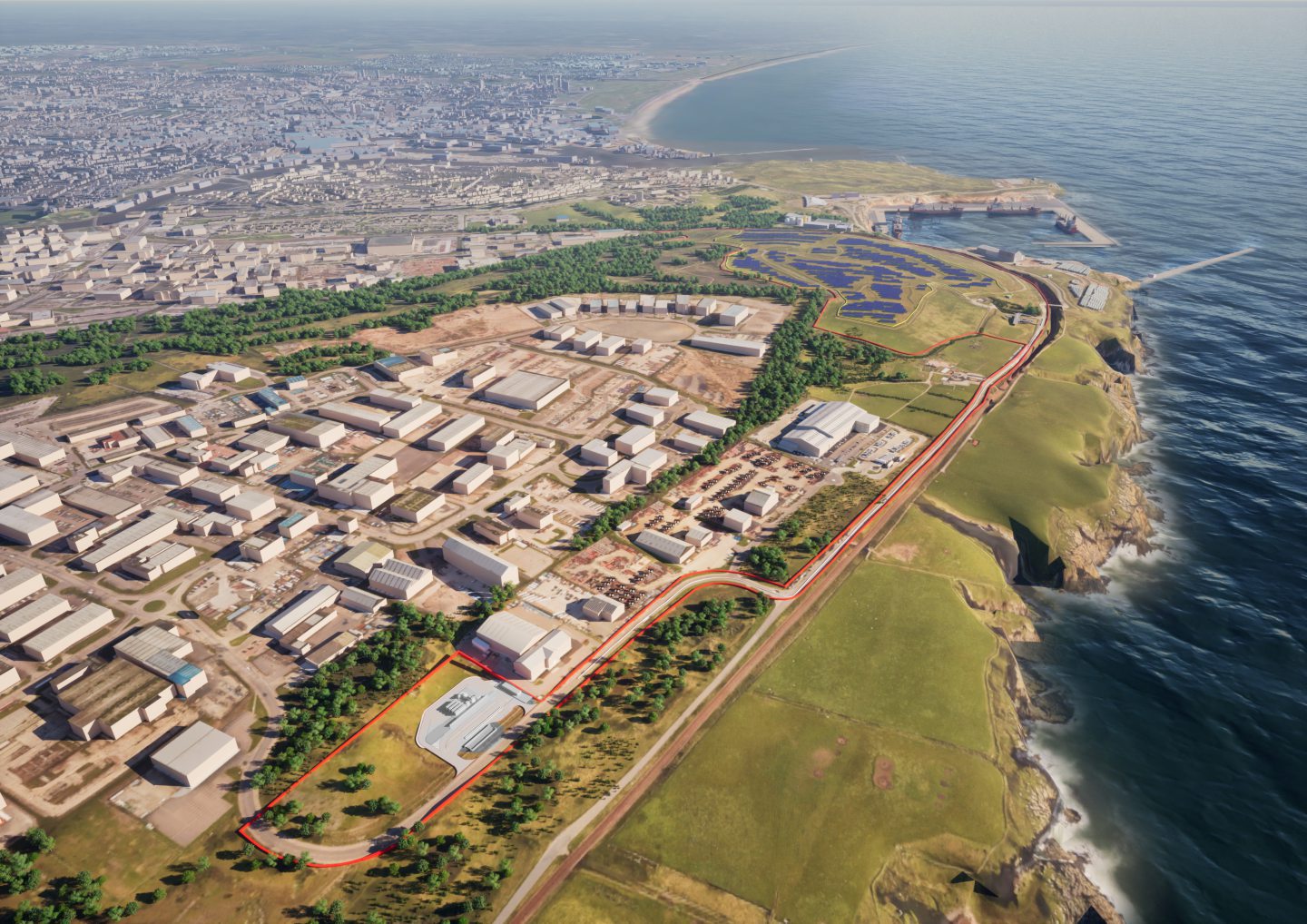 © Supplied by BP
© Supplied by BP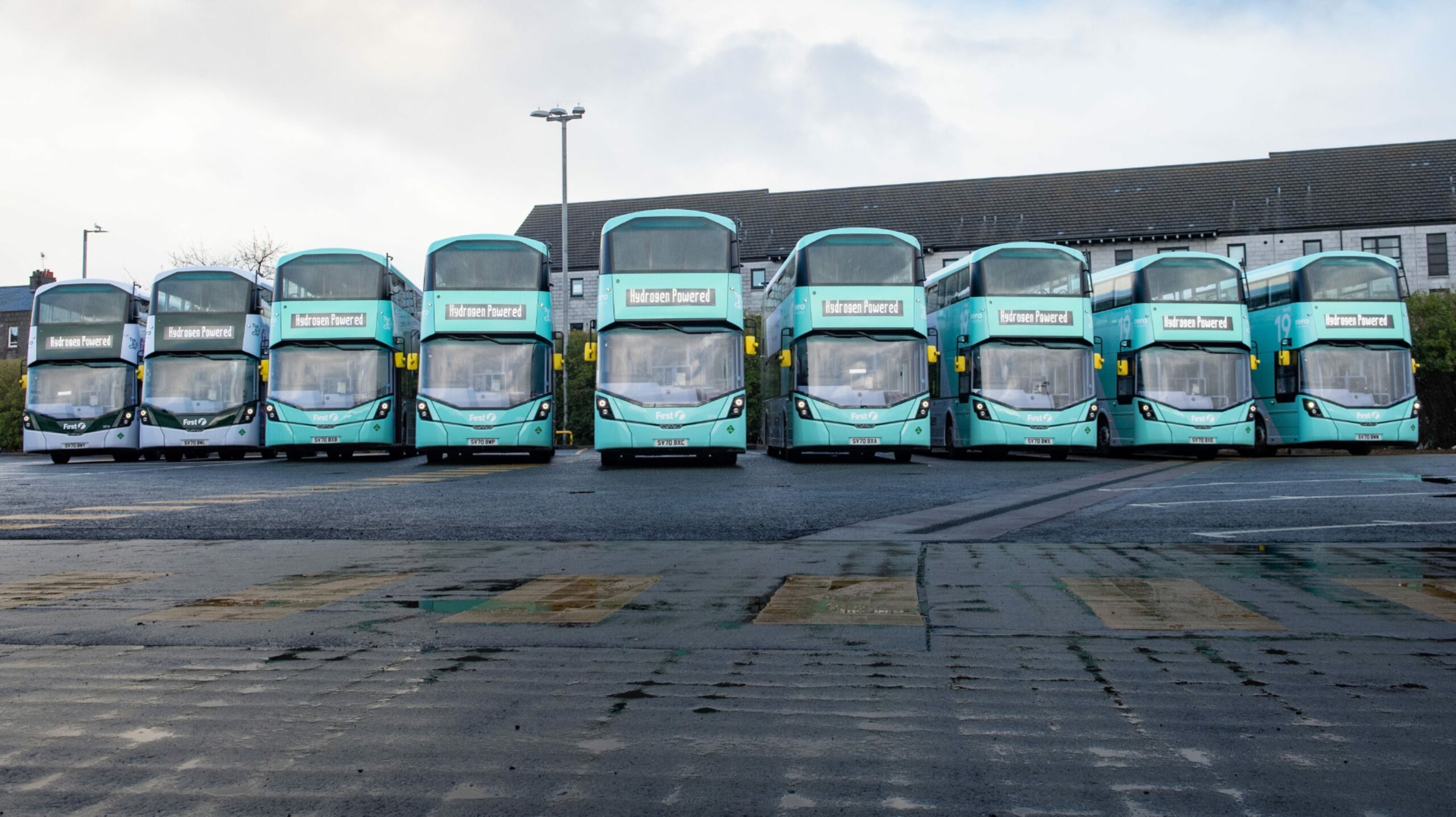 © Abermedia / Michal Wachucik
© Abermedia / Michal Wachucik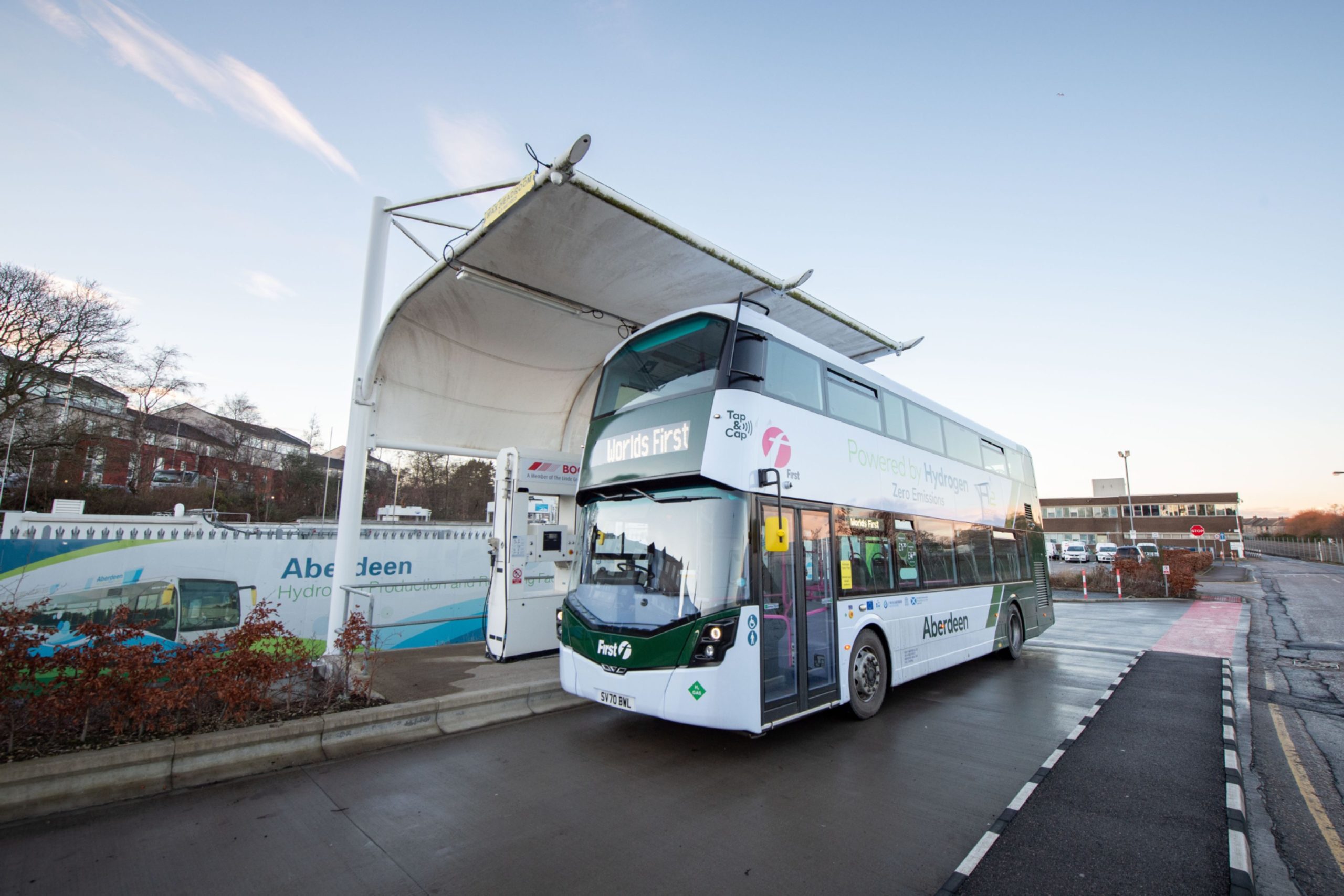 © Supplied by Aberdeen City Counci
© Supplied by Aberdeen City Counci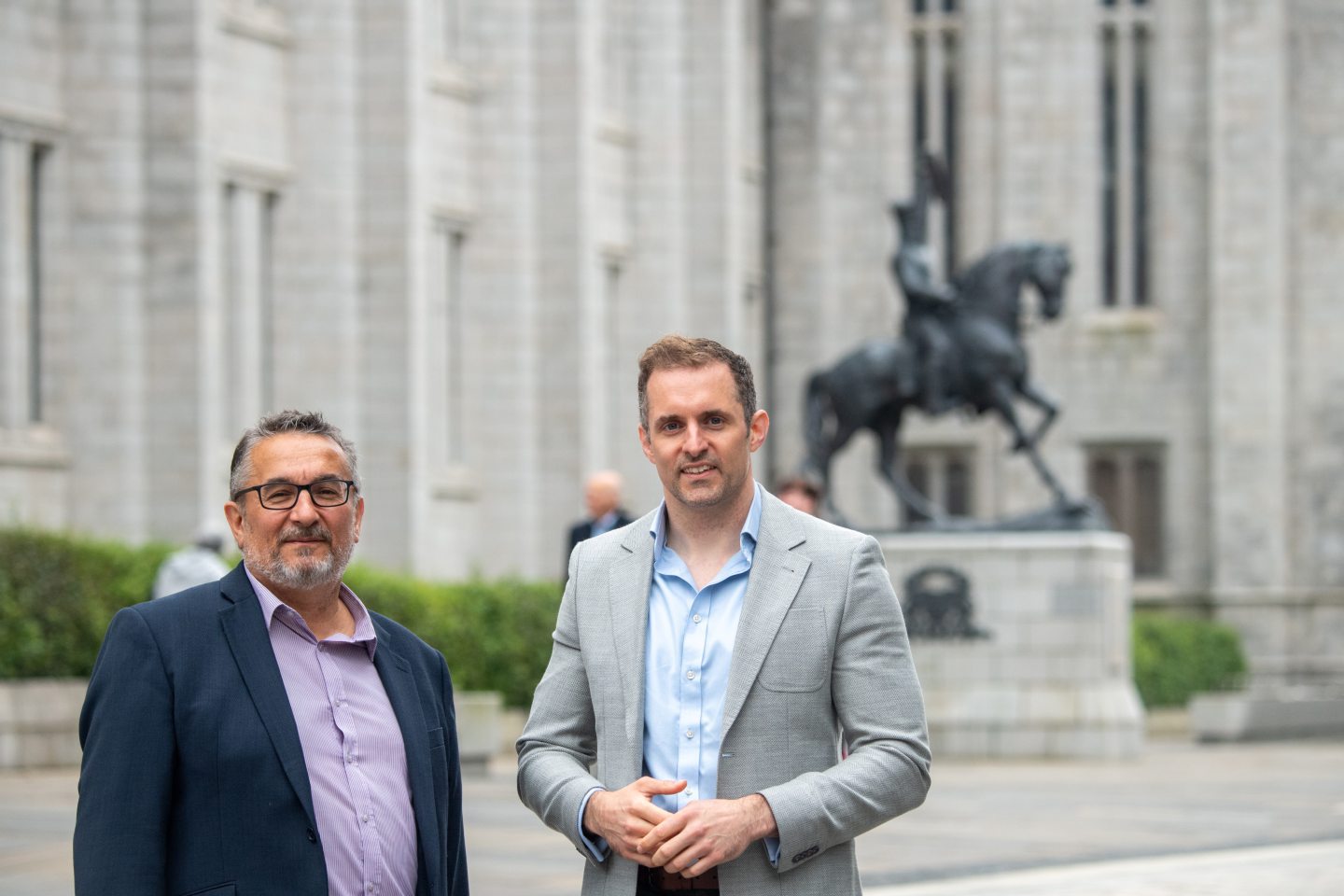 © Image: Kami Thomson/DC Thomson
© Image: Kami Thomson/DC Thomson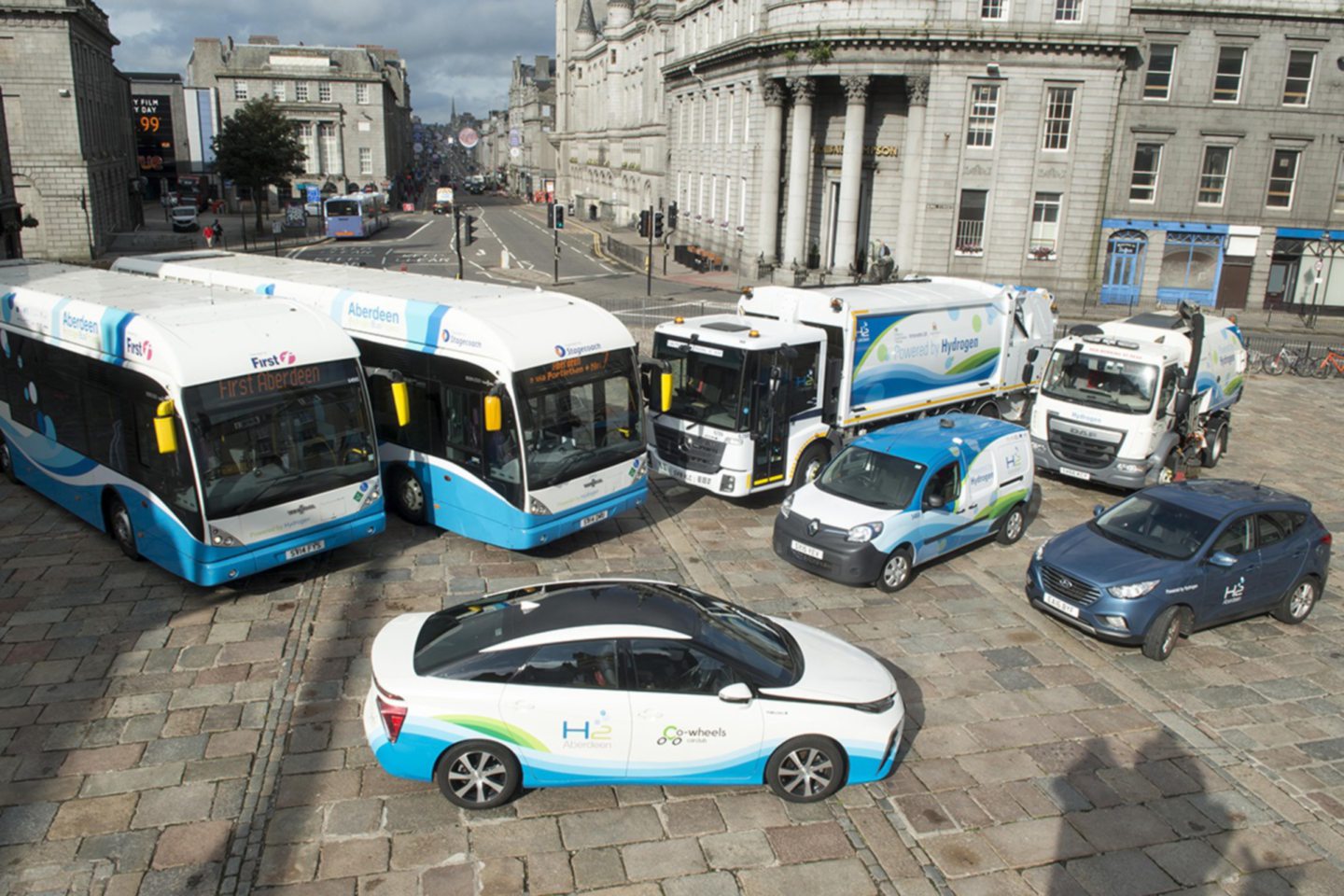 © Supplied by Sure Public Relation
© Supplied by Sure Public Relation






